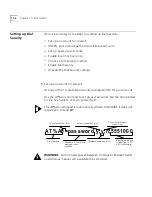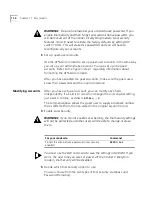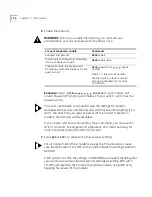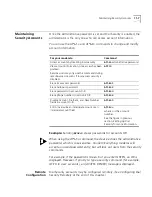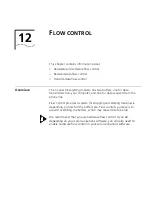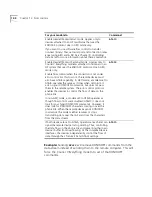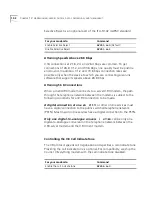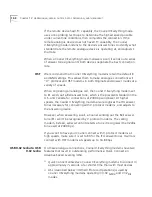
Setting up Dial Security
11-5
Autopass Prompting
Autopass is the default form of password protection. Autopass
automates the process of logging in to the host modem, but it requires
the guest and host devices to be Courier V.Everything modems.
When a guest device attempts an Autopass connection, the guest
includes its password in its V.42 error-control request. The host mode
checks all the enabled passwords in its security accounts for a match.
Password Prompting
Password Prompting allows connections with
any
guest device, as long as
the guest user knows the correct password.
When the host has Password Prompting enabled, it asks guest users for a
password. The host modem checks the received password against each of
its active Security accounts
There is no Password Prompting capability in synchronous mode.
The table below is a comparison between Autopass and Password
prompting.
When using Autopass Prompting
When using Password Prompting
Both the host and guest devices are made
by 3Com and have Dial Security enabled.
Guest devices don’t have to support
3Com Dial Security.
The connection between the Courier
V.Everything modem or modems is under
V.42 error control (See Appendix B,
Alphabetic Command Summary
for
information about using
AT&M4
or
AT&M5
)
V.42 error-control connections aren’t
required
If the guest includes an invalid password,
the host sends an INVALID PASSWORD
message and hangs up.
If the guest sends an invalid password,
the host prompts twice more before
disconnecting.
If the guest does not send a password
after 60 seconds, the host disconnects.
If the guest includes a valid password, the
host permits a secure connection.
The host will still always respond to a
correct Autopass attempt.
If the guest did not enable Dial Security,
the host will not accept the call unless
prompting is enabled on the host Courier
V.Everything mode .
Summary of Contents for Courier
Page 12: ......
Page 28: ...1 14 CHAPTER 1 CONNECTING TO YOUR ISP ...
Page 36: ...3 4 CHAPTER 3 UPGRADING YOUR MODEM ...
Page 58: ...6 6 CHAPTER 6 WORKING WITH MEMORY ...
Page 64: ...8 4 CHAPTER 8 CONTROLLING EIA 232 SIGNALING ...
Page 72: ...9 8 CHAPTER 9 ACCESSING AND CONFIGURING THE COURIER V EVERYTHING MODEM REMOTELY ...
Page 80: ...10 8 CHAPTER 10 CONTROLLING DATA RATES ...
Page 96: ...12 6 CHAPTER 12 FLOW CONTROL ...
Page 108: ...13 12 CHAPTER 13 HANDSHAKING ERROR CONTROL DATA COMPRESSION AND THROUGHPUT ...
Page 112: ...14 4 CHAPTER 14 DISPLAYING QUERYING AND HELP SCREENS ...
Page 122: ...15 10 CHAPTER 15 TESTING THE CONNECTION ...
Page 142: ...17 8 CHAPTER 17 TROUBLESHOOTING ...
Page 156: ...A 14 APPENDIX A S REGISTERS ...
Page 172: ...B 16 APPENDIX B ALPHABETIC COMMAND SUMMARY ...
Page 178: ...C 6 APPENDIX C FLOW CONTROL TEMPLATE ...
Page 186: ...E 4 APPENDIX E V 25 BIS REFERENCE ...












